Direct impact and profound consequences of the Franco-Prussian War
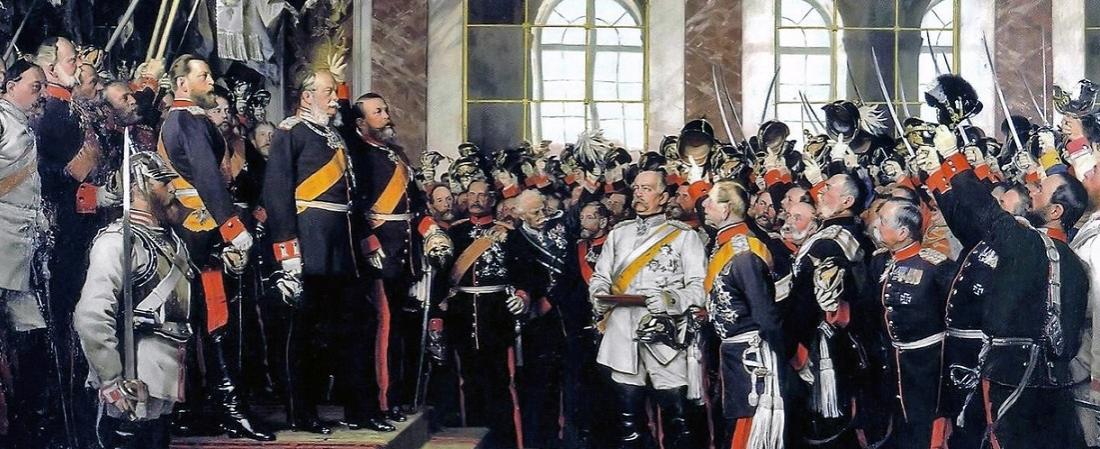
Short (lasting only ten months, six of actual fighting), limited to two nations (the French and the Germans) and relatively unbloody (fewer than 200 000 dead) compared to the conflicts that came before and after it – the Napoleonic Wars and the American Civil War on the one hand, the First World War on the other – the Franco-Prussian War (1870-71) had enormous consequences for the states involved and neighbouring Italy, as well as in terms of international relations. It is no exaggeration to say that the First World War was a product of the Franco-Prussian War, or even that it began a cycle of conflict in Europe that would not end until 1945. Yet, in a sense, the Franco-Prussian War was itself the result of the Revolutionary and Imperial Wars and the defeat inflicted on Prussia by Napoleon at the Battle of Jena, in 1806, and the strong nationalist feeling that arose from it.
In France, the capitulation at Sedan, on 2 September 1870, and the departure of Emperor Napoleon III, who personally commanded his army, into captivity resulted in the overthrow of the Second Empire by the Parisians two days later, but the republican Government of National Defence which took over and decided to go on with the war had no more success than the Empire, despite the energy of Léon Gambetta. After the preliminary peace settlement of February 1871, the people of Paris, who had suffered a long and difficult siege since mid-September, refused to hand over the cannons that protected the capital. There ensued the uprising of the Paris Commune, which descended into civil war and ended in a bloodbath (March to May 1871), leaving a lasting impression. The Republic, which had succeeded in securing a peace deal and restoring order, then took a conservative path which alienated the socialists but rallied the rural masses who constituted the majority of the French population at the time. It would take another decade, however, for it to achieve lasting popularity in the polls.
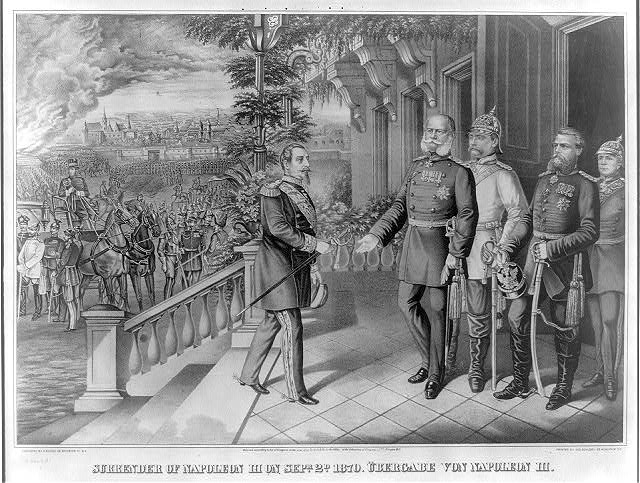
Napoleon III handing his sword to Wilhelm I. Anonymous American engraving, 1871. Library of Congress
The Treaty of Frankfurt of 10 May 1871, which imposed on France the payment of five billion francs in reparations, the occupation of a large part of its territory until that unprecedented sum had been paid in full, in September 1873, and above all the loss of Alsace and Moselle, led to collective low spirits owing to the humiliation of the defeat, and a strong desire for revenge.
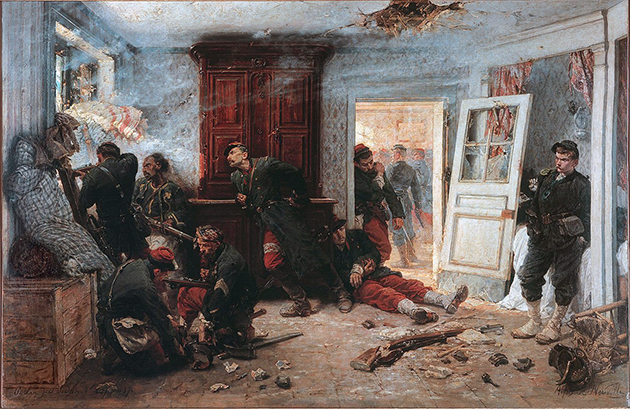
The Last Cartridges, Alphonse de Neuville, 1873. Maison de la Dernière Cartouche, Bazeilles
Under a German law of February 1872 and a French law of April 1873, France and German Alsace-Moselle began to be covered with ossuaries and war memorials, a hitherto limited phenomenon. Le Souvenir Français, founded in 1887, played a major role in preserving the memory of the Franco-Prussian War and those who gave their lives for their country. From as early as 1871, many literary works, paintings and sculptures were already beginning to highlight French heroism, the two most famous examples being undoubtedly Alphonse de Neuville’s painting Les Dernières Cartouches (The Last Cartridges), from 1873, and Auguste Bartholdi’s monumental statue The Lion of Belfort, made between 1875 and 1880 to commemorate the town’s heroic resistance under the orders of Colonel Denfert-Rochereau. In another register, in July 1873 the majority monarchist and catholic National Assembly voted the construction of the Sacré Coeur Basilica – a “National Vow” – on the hill of Montmartre, for France to expiate its sins, from Napoleon III’s entry into war to the Paris Commune, of which Montmartre itself had been a bastion. The failure of the elites raised questions about their education, giving rise, among other things, to the creation of the École Libre des Sciences Politiques by Émile Boutmy, in February 1872, with a multidisciplinary approach and an international openness hitherto unseen in France. Above all, school and the army became the pillars of the fledgling Third Republic, and encouraged the French people never to take their eyes off the blue line of the Vosges mountains, the border with the contemptible Reich.
The Lion of Belfort, Frédéric Auguste Bartholdi
The repatriation of the French troops protecting the Papal States, as a result of the war, in August 1870, enabled the Italians to pursue unification, by taking the city of Rome, on 20 September 1870, then making it the capital of their kingdom, a few months later. Pope Pious IX considered himself a prisoner within the Vatican. The ensuing crisis with the Kingdom of Italy did not come to an end until 1929, with the Lateran Accords which gave the Pope sovereignty over the Vatican City in exchange for his recognition of the Kingdom of Italy.
But the most important consequences of the Franco-Prussian War were seen in Germany. Just as Bismarck wanted, the conflict, which the Minister President of Prussia and Chancellor of the North German Confederation succeeded in inciting the French Empire into starting, through a cleverly engineered provocation (the Ems Dispatch), galvanised the Germans around Prussia, which was by no means a foregone conclusion, in view of local peculiarities, sectarian divisions and fear of the hegemony of Berlin, particularly acute in Bavaria and Baden.
On 18 January 1871, Bismarck proclaimed the German Empire – the Second Reich – for his king, Wilhelm Hohenzollern, in the Hall of Mirrors at the Palace of Versailles, a kind of revenge against Louis XIV’s sacking of the Palatinate, two centuries earlier. Although the new State was in fact a federation of States which preserved many prerogatives, German unification was nevertheless a major event in European and even world history. Continental domination passed from France to Bismarck’s Germany. The people manifested their pride at the creation of the Reichsland of Alsace-Lorraine, hailed as belonging to all Germans, and on the new national day, the Sedantag. Over subsequent decades, Germany saw spectacular economic and population growth. Above all, the German Chancellor succeeded in completely isolating France on the international stage.
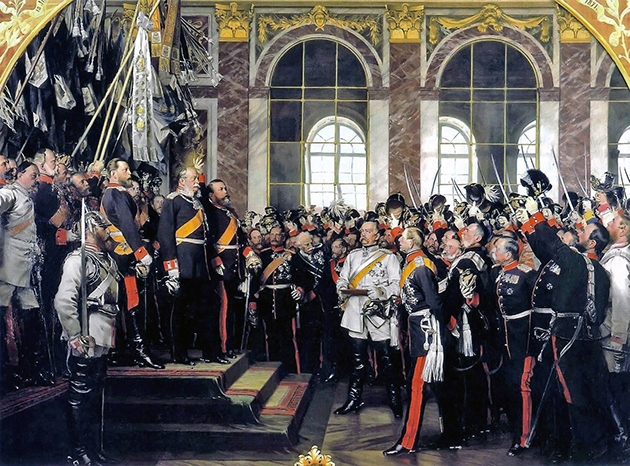
Proclamation of the German Empire in the Hall of Mirrors of the Palace of Versailles, on 18 January 1871., Anton von Werner, 1885. Bismarck-Museum
Two contributory factors were the presence of a republican regime in Paris, which frightened a Europe that was still almost exclusively monarchic, and the strong sense that France wanted to exact its revenge, as the military law of 1872 led one to believe.
Bismarck took advantage of this to organise, in September 1872, a meeting between his emperor, Wilhelm I, the Austro-Hungarian emperor, Franz Joseph, and Tsar Alexander II. Despite the rivalry of Austria-Hungary and Russia, both of which believed they could take advantage of the weakening of the Ottoman Empire to expand into the Balkans, a defensive alliance was agreed the following year between the three powers. With the adherence of Italy to the agreement of the three emperors in 1874, and Britain’s abstention, France’s isolation was complete. However, after the Balkan crisis and the Congress of Berlin in the summer of 1878, which put Vienna and St Petersburg on bad terms, Bismarck decided to strengthen ties between Berlin and Vienna, because he deemed Austria-Hungary to be safer and closer to Germany than Russia. He succeeded in overcoming the reticence of Wilhelm I, who was attached to the Russian alliance, to put his new system in place.
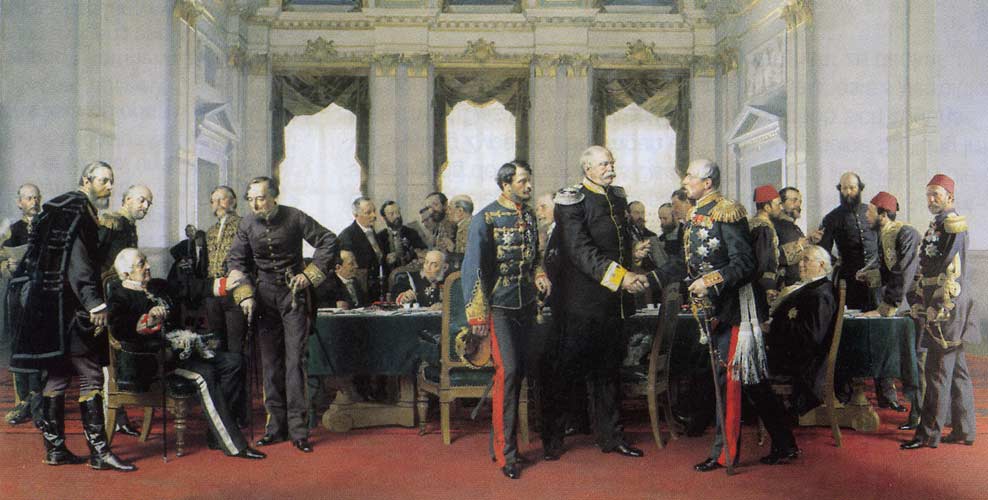
The Congress of Berlin, 13 July 1878, Anton von Werner, 1881. Standing, centre-right: the Hungarian Andrasy, Bismarck and the Russian Chouvalov. Berliner Rathaus, Berlin
On 7 October 1879, the secret treaty of the Dual Alliance was signed. This was a military alliance between Germany and Austria-Hungary, in the event that one of them should be attacked by Russia or one of its allies. It guaranteed, in addition, the neutrality of the partner in the event of an attack by another country. Meanwhile, Bismarck persuaded the new tsar, Alexander III, to sign a new Three Emperors’ Treaty, on 18 June 1881. The text stipulated that, if one of the three powers entered into war against a fourth, the other two would maintain benevolent neutrality. The following year, Italy, at odds with France over Tunisia, joined the alliance. The treaty instituting the Triple Alliance between Berlin, Vienna and Rome was signed on 20 May 1882. If Italy was attacked by France, Germany and Austria-Hungary would offer assistance. In exchange, Germany would assist Italy if it went to war with France, and Austria-Hungary would do so if Italy was attacked by both Russia and France.
Bismarck achieved the remarkable feat of obtaining an entente between Russia and Austria-Hungary, on the one hand, and Italy and Austria-Hungary, on the other. Berlin and London were on good terms, whereas French and British interests were at loggerheads in Egypt. Meanwhile, Germany signed an alliance with Romania and maintained cordial relations with Spain, Turkey and Serbia. With the renewal of the Three Emperors’ Treaty, in 1884, and the Triple Alliance, in 1887, to which even Britain and Spain partially adhered to contain French ambitions in the Mediterranean, this Bismarckian system reached its apogee. France seemed to be completely surrounded this time..
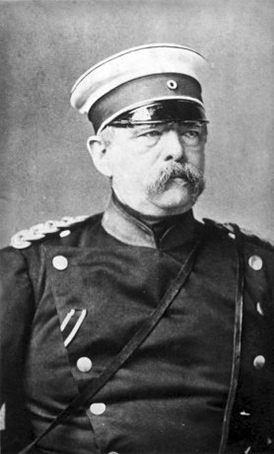
Otto von Bismarck. Source: German Federal Archives
However, after apparently forgetting about the blue line of the Vosges to turn its attention towards colonial expansion in Africa and Asia, under Jules Ferry, France made continental affairs a priority once again, following the fall of the prime minister, in March 1885. Two years later, the Schnaebelé incident brought France and Germany to the brink of war. A police inspector in a small town near the border, Schnaebelé was also a French intelligence agent. Keen to bolster nationalist opinion in the run-up to the German legislative elections, Bismarck decided to act firmly. Lured into an ambush, the spy was arrested on French territory by German police. This caused outrage in France, and the war minister, General Boulanger, prepared for partial mobilisation. The sang-froid of French president Jules Grévy, and Bismarck’s decision to release Schnaebelé, averted the danger in this instance, but nationalist fever did not abate and Boulangism grew.
Across the Rhine, the threats of a coup from General Revanche and of a war being waged by France to recover Alsace-Moselle were taken more seriously than ever. Yet the new German emperor, Wilhelm II, decided to set his country on a path of global expansion that was more in keeping, in his view, with Germany’s status as a major economic and military power. Born in 1815, at the time of the Congress of Vienna, old chancellor Bismarck, who remained a European above all else and was in some ways obsessed with the possibility of French revenge, was forced to resign in March 1890. Over the next quarter of a century, the Triple Entente was put in place to counter the Triple Alliance. It was this standoff between the two belligerents of the Franco-Prussian War and the rival blocs which each had formed around themselves that led to the First World War.
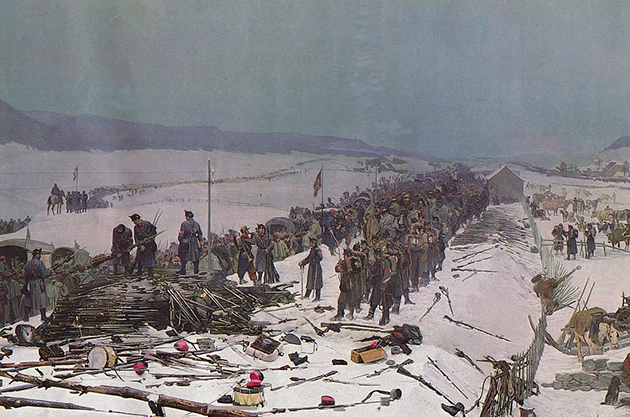
Section of the panoramic painting representing the Bourbaki Army in Switzerland, Édouard Castres, 1881-85. Musée de Lucerne.
However, the Franco-Prussian War also drove the development of international humanitarian law, which saw its first advances with the Geneva Convention. Signed in August 1864, in the wake of the Crimean War, the Italian War of Independence and the Syrian Expedition, and right in the middle of the American Civil War, the Convention laid down rules for the protection of wounded soldiers. It was on the initiative of Tsar Alexander II that the Brussels Conference was then held, in July-August 1874, the direct origins of which can be traced to the Franco-Prussian War. During the course of that war, the laws and customs of war really began to be codified. Meanwhile, the passage of Bourbaki’s vanquished army into the neutral territory of Switzerland to escape the Germans, in January 1871, created an unprecedented legal problem and led to bilateral agreements between France, Germany and Switzerland. It was all ratified in the two big Hague conventions (July 1899 and October 1907), they, too, a product of the Franco-Prussian War and many of whose articles are still in force today.

